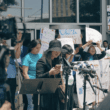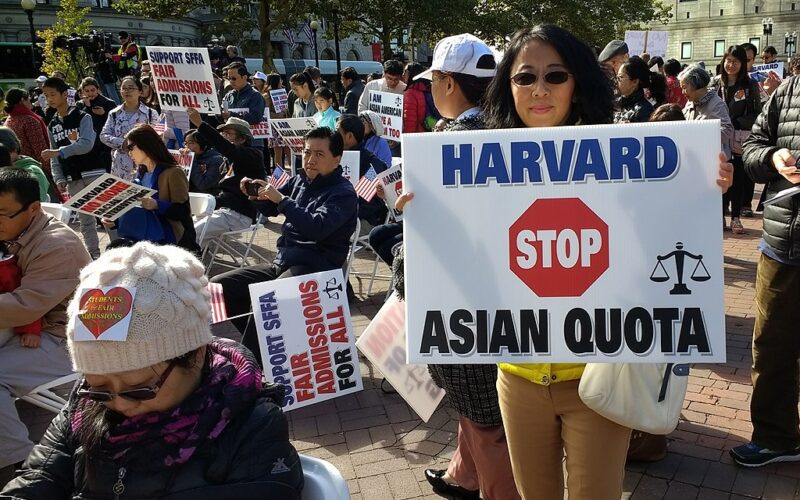Sign up here to receive The Yappie's weekly briefing on Asian American + Pacific Islander politics and support our work by making a donation.
America’s college admissions process is set to change drastically in the wake of the Supreme Court’s decision to strike down race-conscious admissions, which the majority opinion said illegally discriminates based on race.
In two rulings split along ideological lines, the high court found Harvard and the University of North Carolina to be in violation of the equal protection clause of the 14th amendment, which says states cannot “deny to any person within its jurisdiction the equal protection of the laws.”
The rundown: The organization Students for Fair Admissions (SFFA) alleged in the lawsuits that race-conscious admissions benefits Black, Latino, and Native American applicants and while discriminating against Asian and white applicants.
- Race-based college admissions, often referred to as affirmative action, allows universities to consider race in admissions alongside other factors.
- But SFFA claimed that Harvard discriminates against Asian American applicants through subjective standards that rate them based on perceived personal characteristics.
Where things stand: The conservative-majority court ruled 6-3 in the UNC case and 6-2 in the Harvard case. (Liberal Justice Ketanji Brown Jackson, who attended Harvard as an undergraduate and law student, was recused from the latter case.)
- The court ruled that affirmative action policies at the two universities “unavoidably employ race in a negative manner, involve racial stereotyping, and lack meaningful end points.”
- Chief Justice John Roberts, along with fellow conservative Justices Clarence Thomas, Samuel Alito, Brett Kavanaugh, Neil Gorsuch, and Amy Coney Barrett voted in favor of SFFA, while Jackson dissented with Justices Elena Kagan and Sonia Sotomayor.
- “Nothing in this opinion should be construed as prohibiting universities from considering an applicant’s discussion of how race affected his or her life,” Roberts wrote in the majority opinion. “But … the student must be treated based on his or her experiences as an individual—not on the basis of race.”
- “With let-them-eat-cake obliviousness, today, the majority pulls the ripcord and announces 'colorblindness for all' by legal fiat. But deeming race irrelevant in law does not make it so in life,” Jackson wrote in her dissent.
- In a separate dissent, Sotomayor addressed discrimination against Asian Americans directly, writing that there is “no question that the Asian American community continues to struggle against potent and dehumanizing stereotypes in our society.”
- “It is precisely because racial discrimination persists in our society, however, that the use of race in college admissions to achieve racially diverse classes is critical to improving cross-racial understanding and breaking down racial stereotypes,” she continued, refuting Thomas’ argument that the policy benefits Black and Latino students to Asian Americans’ detriment.
Don’t forget: Asian Americans have historically played a role in building affirmative action policies, dating back to activism by the Japanese American Citizens League and other AAPI groups post-World War II, Ellen Wu reports for Slate. This decision dismantles that work.
- “Without affirmative action advocating for college admissions offices to view students as holistic people, I wouldn’t be who I am now,” wrote Vietnamese American educator Ngan Nguyen in a column for Reappropriate. “I know many students like me—a first generation, low-income, Asian American student—wouldn’t have had the opportunity to pursue what we wanted if it wasn’t for affirmative action.”
Proponents of the decision: About three-quarters of all Asian adults (76%) say race or ethnicity should not factor into college admissions decisions, according to a 2023 survey conducted by Pew Research Center.
- Roughly half of Asian Americans who have heard of affirmative action say it is a good thing. Respondents expressed mixed feelings about the idea of considering race in college admissions, however, and assessments differed slightly by ethnic group. Indian adults (60%) were more likely than Korean (50%), Vietnamese (48%), and Chinese (45%) adults to say affirmative action is a good thing, according to Pew.
- “This is a historic victory for Asian Americans, because our children will no longer be treated as second-class citizens in college admissions,” Yukong Mike Zhao, president of the Asian American Coalition for Education, said in a statement. “Moreover, the ruling will abolish the only remaining race-based law, advancing America toward a color-blind society.”
- The decision could “very well mean that Harvard and other elite universities finally can no longer use 'diversity' as a smokescreen to impose ceilings on groups that they disfavor," S.B. Woo, president of 80-20 Educational Foundation, said earlier this month.
Untangling the model minority myth: AAPIs as a whole are one of the most college-educated racial groups, per a 2017 report by AAPI Data. Yet there are vast differences in educational opportunity between different AAPI subgroups.
- Of the six most-populous ethnic groups in America (Chinese, Filipino, Indian, Korean, Vietnamese, and Japanese), Indian Americans have the highest share of college degree holders (75%), while Vietnamese Americans (32%) have the lowest share.
- The percentage of college degree holders is even lower for groups like Laotian (18%) or Bhutanese Americans (15%), a 2023 Pew survey found.
- “Centuries of systemic and structural inequity have resulted in significant disparities in access to quality education and opportunities,” National Korean American Service and Education Consortium Director of Communications and Special Initiatives Rachel Koelzer said in a statement to The Yappie. “Affirmative action and race-conscious admissions acknowledge these historic and present truths and seek to rectify them by considering race as one factor among many.”
Maintaining collective solidarity for AAPIs means continuing to acknowledge the disparities and inequities among AAPIs subgroups. It’s especially important for people to recognize their own power and use their privileges to center those most marginalized, Empower Pacific Islander Communities Executive Director Estella Owoimaha-Church told The Yappie.
- “When so much of the narrative around affirmative action seems to be East Asian and as if Asian communities in mass are asking for race-conscious admissions to end, it pits our communities against one another,” added Owoimaha-Church, who noted that race-conscious admissions policies gave her a chance at higher education despite not having academic resources like college counseling. “It's important that we are working and moving in solidarity alongside one another.”
This story appeared as "The Big Story" in The Yappie's June 30, 2023 newsletter.
The Yappie is your must-read briefing on AAPI power, politics, and influence, fiscally sponsored by the Asian American Journalists Association. Make a donation, subscribe, and follow us on Twitter (@theyappie). Send tips and feedback to [email protected].









